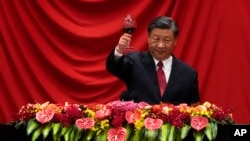Three leaders at key Chinese aerospace and defense firms have been removed from the Communist Party’s top political advisory organ amid Beijing’s effort to purge key figures related to the Chinese military, the official Xinhua News Agency said Thursday.
The military purge is part of Chinese leader Xi Jinping’s hallmark anti-corruption campaign that has seen several top-level commanders being removed from their positions and facing corruption-related investigations. The anti-corruption campaign has been viewed by some experts as a way for Xi to remove political opponents or individuals viewed as posing threats to his leadership.
Xinhua said the Chinese People’s Political Consultative Conference decided Wednesday to dismiss Wu Yansheng, chairman of the China Aerospace Science and Technology Corporation, Liu Shiquan, chairman of Norinco Group, and Wang Changqing, a deputy manager at the state-owned China Aerospace Science and Industry Corporation.
Wu’s company oversees the development of China’s spacecraft and missile programs, while Liu’s Norinco Group is one of China’s leading manufacturers of military equipment. State media reports did not provide details about their removal, but a report by Hong Kong’s Sing Tao Daily claimed that the three were involved in an investigation related to the Chinese military’s rocket force, citing unnamed sources.
Some analysts say the latest wave of the purge reflects the large scale of corruption in China’s defense industry and that it could affect the Chinese military’s combat capabilities.
"I think there may be a great deal of corruption in the Chinese defense industry and inevitably, it will have an impact on the People’s Liberation Army’s combat effectiveness," Lin Ying-yu, a China military expert at Tamkang University in Taiwan, told VOA by phone.
He added that the purge in the military also shows Xi’s desire to reinforce his control over the arms trade in China.
"In the past, a large part of China's arms trade was controlled by the princelings, who are descendants of senior Communist Party leaders," he told VOA. "The purge probably means Xi wants to reassert his control over arms trade."
Apart from affecting the Chinese military’s capabilities and strengthening Xi’s control over arms trade, other experts say the abrupt removal of top military commanders could also damage morale in the Chinese military and create unexpected challenges to Xi’s control over the military.
"The series of corruption scandals may create internal skepticism toward the credibility of the top leadership and form a vicious cycle that eventually affects Xi’s control," Su Tzu-yun, a military expert at the Taipei-based Institute for National Defense and Security Research, told VOA by phone.
Since the Chinese military lacks real combat experience and has limited joint warfare capability, Su said he thinks the growing internal turbulence may pose greater risks to the operation of the Chinese military.
"The PLA may face a situation where it has a huge military force but their capability may be shaky," he said.
Mounting challenges amid personnel reshuffling
The latest wave of purge follows a series of removals of top military leaders in recent months. In October, China removed then-Defense Minister Li Shangfu, who had been missing from public view since August and is reportedly facing an investigation for corruption, according to Reuters and The Financial Times.
Some observers say the personnel shakeups in China’s military is connected to an investigation into the PLA Rocket Force’s equipment procurement process, which the Chinese authorities said is controlled by a small circle of people, according to a notification released by the Central Military Commission’s equipment procurement department on its official WeChat account. Li, the former defense minister, was the head of the department from 2017-22.
His removal also came after two top leaders of the Rocket Force, which oversees the PLA nuclear arsenal, were replaced by military commanders from other units.
By installing non-rocket specialists as leaders of the specialized unit, Lin said Xi is prioritizing the loyalty of these commanders over their expertise.
"The new commanders of the Rocket Force have no expertise in this field and this decision shows that Xi is looking for someone he can trust," he told VOA.
Su, from the Institute for National Defense and Security Research, added that Xi’s efforts to overhaul the Chinese military based on loyalty may reduce the flexibility of the Chinese military.
"Since he came to power in 2012, around 58 generals have been purged by Xi, and his extreme emphasis on loyalty could compromise the agility and flexibility of the Chinese military in real combat situations," he told VOA.
Su added that when the military’s allegiance is concentrated on one person, it may become less responsive to the rapidly changing situation in a war as the power to command is held solely by that individual.
Lin said Xi’s campaign to strengthen his control over the Chinese military through purges will be "difficult to stop."
"Xi knows that he needs to get the military under his control before he can control everything," he said, adding that what matters to Xi is the "absolute loyalty" of the military rather than its actual combat capabilities.
"He would like to achieve a reign of terror, just like what Stalin did before the Second World War," Lin said.




